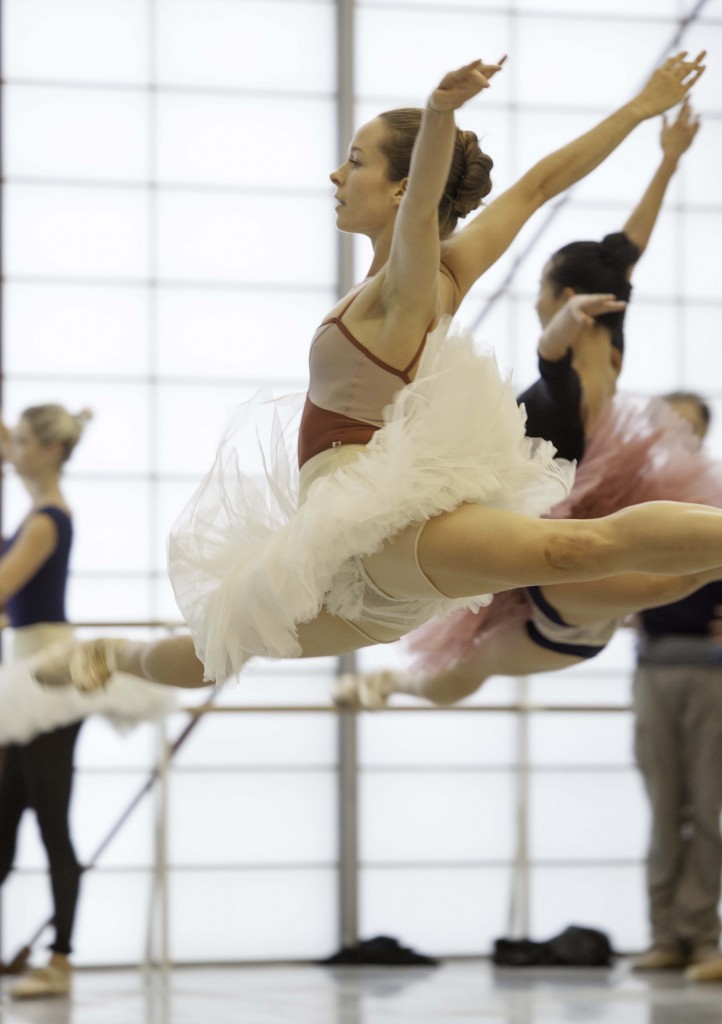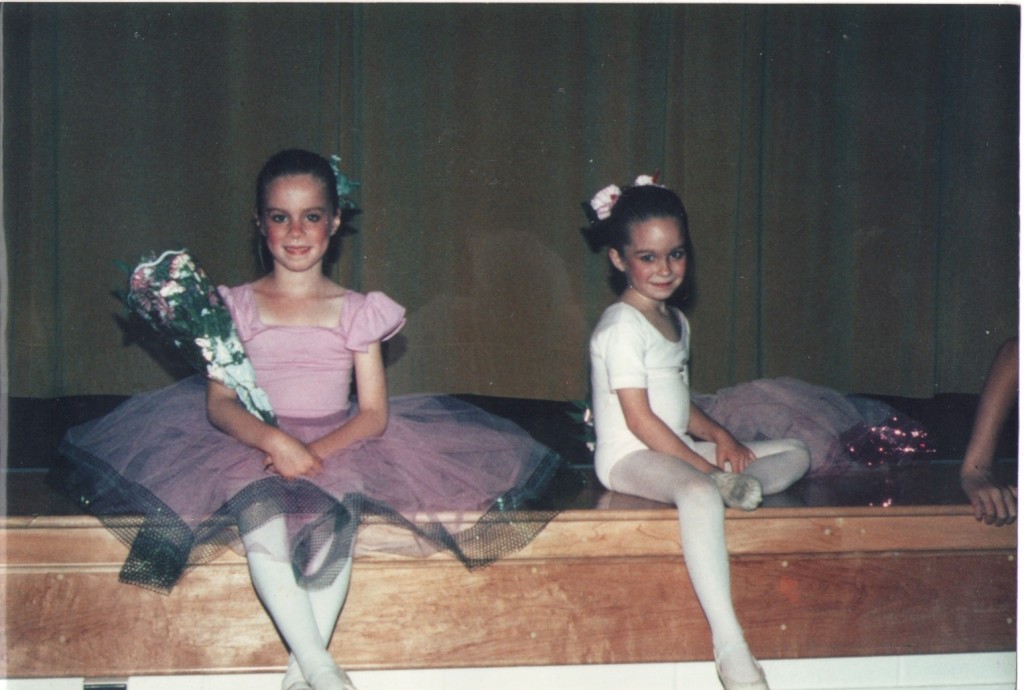
Dance, like any other career, has a learning curve. With time and experience, you find ways to navigate your daily life in this art form–and piece by piece you learn what works best for you in terms of a career path. It isn’t always easy–especially in the beginning–but over time, most dancers find their own way.
Our new series features posts from professional dancers from companies across the nation. They’ll be writing about a variety of different topics, sharing a behind-the-scenes look at what this career looks like up close…each from their own individual perspective.
Today we’ll be hearing from our new contributing writer Alessa Rogers. A dancer at Atlanta Ballet, she has graciously pulled together some of the most valuable things she has learned over the course of her career to share with you here–including a piece of advice from Twyla Tharp! Look for more posts from Alessa and other professional dancers in the coming months.
We hope you are enjoying this new series! –Catherine

by Alessa Rogers
There is no formula for being a professional ballet dancer. There are some obvious requirements like having a good work ethic, a good teacher, a fair amount of luck–and a lot of Advil. But there are some other tips that I’ve picked up over the course of the past couple decades that I have found useful in my career.
1) Don’t quit. This may seem like a no-brainer but sometimes I feel like the reason that I managed to become a professional dancer over some of the girls I trained with is simply that I stuck with it and they didn’t.
2) Be nice. By criticizing others you take energy away from improving yourself. Gossip will not make you a better dancer and it will definitely make you a less desirable person to be around. Remember that the dance world is incredibly small. You will run into the same people again. Make it so that when you do run into those people they are happy to see you. You never know when it will pay off to have been kind.
Even when you are doing a solo, don’t forget about the countless people who helped you get to where you are today–your parents, teachers, the artistic staff, even the production crew. These people don’t get a curtain call or spotlight. Be grateful to those people in your life and when you get a chance, pass it on.
3) Love your body, worship it, treat it well. As a dancer, your body is the only instrument you have. Listen to it when it hurts and needs special care. Kiss your feet before a show. Say thank you to your body after a long week. Ballet gives us nothing to hold, so care for your body like a museum would care for a masterpiece.
4) Learn from others. Watch dance voraciously. Watching the people in your class is the easiest way to do that but these days you can watch almost anything online. If possible go see professional dance live. Ask professional dancers questions. Learn from them. But learn from your friends too. A correction for them is also a correction for you. Which brings us to:
5) Corrections are good things. Don’t feel ashamed or take it too personally if you get a correction. Feel grateful that you have a chance to improve. Strive to hear a correction only once.
As soon as I am given a correction I repeat it in my head a few times to help it stick. Later I might write it down. Be patient with yourself if it does take some time to apply. Bodies respond differently everyday and habits are hard to change but make no excuses when something doesn’t work. Mistakes happen, even when you are a professional dancer. Learn from them and then let them go.

6) There will always be someone better than you. The sooner you realize this the sooner you will be able to be proud of where you are right now and how far you’ve come. Having people who are better than you should give you inspiration–not depression. Be gentle with yourself. A dancer has to work hard enough, don’t put yourself down while you are doing it. Trust me, other people will do that for you. Be patient with yourself and ignore the naysayers, especially if the naysayer is you. You are almost certainly better than you think you are.
7) You have to find the right company for you. It might take a few before you find a good fit. Having a dream company is good for motivation, but realize there are so many factors that go into hiring dancers. If that dream company passes you up because they need a brunette this season that shouldn’t crush your dreams of being a dancer in general.
Find a company that will appreciate you and also push you to be the best dancer you can be. When you do get a job don’t be afraid to have respectful conversations with your director about issues that concern you. Also, cattle call auditions are rarely the best way to be seen.
8) Work smart. A ballet career is so short. You have to work hard to make use of the time you have. This does not always mean physically (but do that too). You can save a lot of time and energy if you use your brain as well.
Instead of throwing yourself into doing something poorly over and over again pause and think about how you could approach it differently. You’ll find you have more control over your body and improve more rapidly. Decide before each combination what you are going to focus on in that combination. It might be your port de bras or playing with the musicality or spotting a different place. Thinking about an intention before each combination or visualizing the choreography in your head before you actually take a single step will help enormously.
Also, do your homework at night. Go over your part, research your roles and take care of your body so you are prepared for the next day.
9) Learn every part. No one likes being an understudy but I have known so many dancers who got their big breaks because they knew the part when the first cast went out. Don’t be expendable–make yourself as useful as possible. Most directors will be impressed if you quietly learn extra parts in the back. Plus, learning extra parts will make the time go faster and challenge your brain.
10) Figure out how you work best. Knowing yourself is a great tool. Does it help you to write down corrections after class? What about listening to the music before rehearsal or visualizing the choreography before bed? Whether it helps you to sometimes mark the steps or if it’s better to do it full out every time–learn how you learn. Then put it into action. This includes knowing how your body works best–what food best fuels you, how much sleep you need, what type of cross-training benefits your particular body.

11) Appreciate that ballet is more than any one step or body part. Whatever you are good at in ballet be proud of. Whatever you are bad at accept and embrace for its challenge. I know dancers that have had amazing careers despite not having a perfect body or being inflexible or being bad at turns (ahem, hi). Don’t get hung up on what you can’t do and don’t compare yourself to others. They have their own struggles too.
12) Do your show. Twyla Tharp told me this. She said the audience has a job and the reviewers have a job and the choreographer has a job and the artistic director has a job and all of those people’s jobs are irrelevant to your job which is to do your show. Stay present and focused on your dancing and all the rest is not your concern.
13) Enjoy the process. The stage gets all the glamour but remember that opening night is just one night. It will pass in the blink of an eye. The everyday classes and rehearsals, however, will go on. You might have the most glorious show of your life but the next day you’re going to have to go back to that barre. Love the work itself because that will never go away.
14) Have a good support group. Love your friends. It’s one of the greatest joys of my life that I get to surround myself with such passionate, beautiful people on a daily basis. Ballet is so hard but having good friends makes it all worth it. When you’re injured or there’s a difficult choreographer or you’re doing the 40th Nutcracker of the season you will need that support group to lean on and keep you sane.
15) Fake it. There will be many moments when you don’t feel prepared. That is ok. That is when you will surprise yourself with how very much you actually are ready for this. If you don’t have confidence, pretend like you do. If you are exhausted, pretend like you are not. If you can fool other people you might be able to fool yourself too.
16) Be curious. Ask questions if you don’t know how to do something. Be an explorer of your body. Push the limits of what you are capable of to find your edge. If you are constantly curious about your body then you will constantly be amazed at the discoveries you find about it. Be curious, also, about the world. Being a well-rounded person will make you a better dancer because you will have more experiences and emotions to draw from. Choreographers are often more interested in openness then technique.
17) Don’t take it for granted. To dance is a gift. You are not owed this. You are so lucky every single day that you can wake up and dance. To have a capable body and talent and something you are passionate about is not something every person has. A dance career is so fleeting, and it could end suddenly at any moment. Embrace it while it’s here.
18) Have fun. Have perspective and don’t take yourself too seriously. It’s just ballet!

Contributor Alessa Rogers began her dance training with Daphne Kendall and left home at fourteen to attend the North Carolina School of the Arts. Upon graduation she spent one season with North Carolina Dance Theatre II before joining Atlanta Ballet where she has been for the past eight years.
Favorite roles at Atlanta Ballet include Juliette in Jean-Christophe Maillot’s Romeo et Juliette, Margaret in the world premiere of Helen Pickett’s The Exiled, Lucy in Michael Pink’s Dracula, Ophelia in Stephen Mills’ Hamlet, Lover Girl in David Bintley’s Carmina Burana, and Princess Irene in the world premiere of Twyla Tharp’s The Princess and the Goblin.
She has performed works by Jorma Elo, Wayne McGregor, Ohad Naharin, Christopher Wheeldon, Christopher Hampson, Dwight Rhoden and Tara Lee. She has been a guest artist with the National Choreographers Initiative in California and Terpsicorps Theatre of Dance in Asheville, N.C.
In her spare time she likes to read, write, cook vegetables, meditate, travel and rock climb.





TERRIFIC insights for learning, growing, and improving in ANY form of movement art. Thank you for this collection.
Thanks for the comment!
Be honest about your ability. Immerse yourself in all things dance. Explore dance styles and other physical activities. Dance training is essential in establishing yourself as a professional, but don’t limit yourself when it comes to style. If ballet is your passion, take a few hip hop or jazz classes. You can gain new skills and perhaps discover that you enjoy forms you’d never thought about studying before.